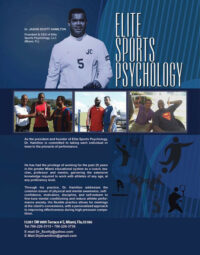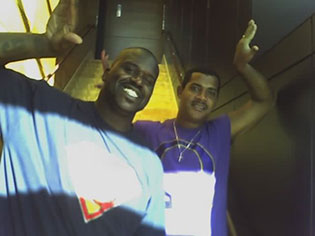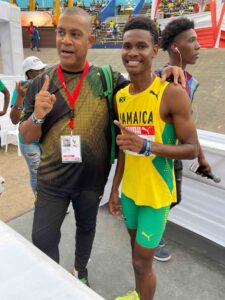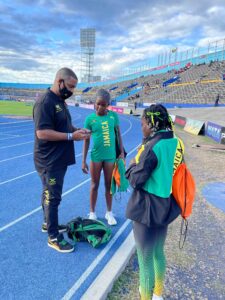 As the president and founder of Elite Sports Psychology (ESP. Miami, FLA.), Dr. Hamilton is committed to taking each individual or team to the next level of their performance. Dr. Hamilton improves confidence and composure through mental conditioning. He builds the mental skills to help athletes reach their goals and compete at their best on any given day. His client’s enjoy the convenience of working with Dr. Hamilton on site and in home. He will come to you!
As the president and founder of Elite Sports Psychology (ESP. Miami, FLA.), Dr. Hamilton is committed to taking each individual or team to the next level of their performance. Dr. Hamilton improves confidence and composure through mental conditioning. He builds the mental skills to help athletes reach their goals and compete at their best on any given day. His client’s enjoy the convenience of working with Dr. Hamilton on site and in home. He will come to you!
Dr. Hamilton has worked with individuals and teams who have been ranked number one in the world. He has found that when an athlete believes they are at the highest point or the pinnacle of their career, there is still another level that they can achieve. He has had the privilege of working with youth for 20 years in the school system as a coach, teacher, professor and mentor and has the knowledge to relate to all ages at their stage of development.
Dr. Hamilton works with his clients on issues like PERFORMANCE ANXIETY, FEAR OF FAILURE, personal awareness, self-confidence, motivation, discipline, and self-esteem. By setting goals through relaxation and visualization, clients will increase their effectiveness during pressure situations. Often time he has found that the client may be their own worst enemy due to self-doubt.
There are so many athletes who are not tapping into what they are truly capable of because of fear and also because they have never been taught about the power of Sports Psychology. If you want to take yourself or your team to the next level, Dr. Hamilton and Elite Sports Psychology (ESP) can help you.
 Elite Sports Psychology (ESP) is owned and operated by Dr. Jason Scott Hamilton. Dr. Hamilton is a Licensed Clinical Psychologist in the country of his birth Jamaica, Registration Number # 12-0170. In Miami, he specializes in the Peak Performance of Athletes, Entertainers, and others, and transfers Psychiatric or Mental Health issues to Colleagues.
Elite Sports Psychology (ESP) is owned and operated by Dr. Jason Scott Hamilton. Dr. Hamilton is a Licensed Clinical Psychologist in the country of his birth Jamaica, Registration Number # 12-0170. In Miami, he specializes in the Peak Performance of Athletes, Entertainers, and others, and transfers Psychiatric or Mental Health issues to Colleagues.
ESP seeks to improve the performance of athletes, entertainers, sports franchises, and organizations. ESP became an LLC in 2008. After obtaining his Ph.D. in Clinical Psychology in 2003, Dr. Hamilton decided to specialize in a field he loves, Sports Psychology. Sports psychology is a branch of psychology. It is the study of the psychological factors that affect participation and performance in sports. It is also a specialization within the brain psychology and Kinesiology that seeks to understand psychological/mental factors that affect performance in sports and apply these to enhance individual and team performance. ESP helps to increase performance by managing emotions and minimizing the psychological effects of injury and poor performance. ESP works with individual athletes, teams, coaches and management onsite or via Skype. Treatment is tailored to meet the specific needs of the athlete, team and coaching/management staff, based on a comprehensive survey of the individual’s needs and goals. In addition to working with athletes, ESP offers high-performance workshops for organizations. Successful business can be just as competitive as sports and the training and lessons of sports psychology can also apply to employee performance.
Services include:
- For Teams and Athletes: Sports Psychology Survey and Feedback Mental Skills Training Team Presentations and Workshops Team-building Strategies and Exercises
- For Corporations and Business Leaders: Executive and Organizational Surveys and Feedback Executive, Management and Organizational Consultation Corporate Speaking and Workshops Team-building Strategies and Exercises Improved Performance for Sales Teams and Leaders Nonprofit Leadership Surveys and Funding Advisory Services Sports Psychology is not new to athletes, however, it has become more widely accepted and respected in recent years. In the past 10 years Dr. Hamilton has also worked in the area of academia and research, he was the Director of Research of the McNair Program at a Florida State University and the Associate Dean in the College of Medicine at the same Florida State University. Dr. Hamilton has helped several teams to dominate and win their respective divisions and competition. In the USA, Dr. Hamilton worked for many years with several school teams and was the Performance Coach for an NCAA State University team. He recently assisted a soccer team to dominate their division for seven consecutive years. The manager of the team commented that “the team never won the championship in any year that Dr. Hamilton was not involved with the team.” Dr. Hamilton also recently assisted a female athlete to overcome anxiety and fear, which resulted in nosebleeds, to be the first Cuban American female to make the USA National team in synchronized swimming. The five-time Cuban American World Champion Gymnast and two time Olympic Bronze and Silver medalist had this to say about Dr.Hamilton on his Instagram. @danelljleyva. “Little late, but I wanted to extend a big THANK YOU to @drjshamilton for helping me with my journey in getting to RIO, and even during RIO..You are as great a person as you are a Psychologist, thanks again”.
In the Caribbean island of Jamaica, Dr. Hamilton was publicly recognized for helping the Harbour View Premier League Football team for the 2013 season to become the champions again as they did in 2000, 2007 and 2010 seasons. Currently, he has had the opportunity to work and travel with the World Champions of T/20 cricket the West Indies Cricket Senior Team and his services are requested throughout the Caribbean. He has a unique style of communicating and relating to athletes which have been well received and has brought forth new and exciting opportunities.
 One of the services that ESP provides that stands out amongst others in the psychology field is Dr. Hamilton’s ability to work on-site with the athletes and travel to competitions and other events. His availability is an asset when working with teams and individuals who travel worldwide for major tournaments. These are the times when the athletes need Peak Performance training in order to succeed. The future of ESP is bright, and the goal is to bring Sports Psychology to the forefront and eliminate the stigma attached to Peak Performance training. In all sports and with all elite athletes, 90% of their performance is based on their mind, and their thoughts and the other 10% is ability. So if you are able to better the psychological aspects of your game, the rest will fall into place. In team sports the team’s success is your success and in individual sports your minds success will result in your personal success.
One of the services that ESP provides that stands out amongst others in the psychology field is Dr. Hamilton’s ability to work on-site with the athletes and travel to competitions and other events. His availability is an asset when working with teams and individuals who travel worldwide for major tournaments. These are the times when the athletes need Peak Performance training in order to succeed. The future of ESP is bright, and the goal is to bring Sports Psychology to the forefront and eliminate the stigma attached to Peak Performance training. In all sports and with all elite athletes, 90% of their performance is based on their mind, and their thoughts and the other 10% is ability. So if you are able to better the psychological aspects of your game, the rest will fall into place. In team sports the team’s success is your success and in individual sports your minds success will result in your personal success.
Thank you for stopping by and good luck utilizing all the benefits of performance coaching and sports psychology! Call ESP today at 786-226-5115 or send an email to drjshamilton@gmail.com
 I am honored to have had the opportunity to work with the Jamaica Olympic team in Tokyo and, more recently, work with the Sports Medical team at the CARIFTA games. I am happy to see the direction the JASM is going as they recognize the importance of mental performance and issues in athletics. The focus has been on the physical well-being of athletes, but the mental pain that comes with defeat, injury, and competition anxiety, to name a few, is equally as important.
I am honored to have had the opportunity to work with the Jamaica Olympic team in Tokyo and, more recently, work with the Sports Medical team at the CARIFTA games. I am happy to see the direction the JASM is going as they recognize the importance of mental performance and issues in athletics. The focus has been on the physical well-being of athletes, but the mental pain that comes with defeat, injury, and competition anxiety, to name a few, is equally as important.
There has been a great deal of competitions of late; Champs, CARIFTA games, upcoming Penn Relays, Commonwealth games, and 2024 Paris Olympics/Paralympics. The athletes can get physically and mentally stronger with each competition, so I am looking forward to working with these athletes as they continue to deliver on the national stage. With the continued support of the JASM and its affiliates, we can surround the athletes with the assistance they need, physically and mentally.
 It is estimated that approximately 13 percent of the global population experience some form of mental health disorder. Indeed, mental health disorders are one of the leading causes of functional impairment worldwide, causing the highest disease burden.
It is estimated that approximately 13 percent of the global population experience some form of mental health disorder. Indeed, mental health disorders are one of the leading causes of functional impairment worldwide, causing the highest disease burden.
While evidence consistently demonstrates that Elite physical activity is associated with improvements in physical and mental wellness, studies nonetheless show that just over one in three athletes may experience mental health symptoms.
Despite their unique sporting talents, athletes are not immune to mental health challenges, such as fear of failure, burnout, distress, anxiety, depression, unhealthy eating patterns, insomnia, and alcohol or drug misuse.
Many different factors can impact athlete mental wellness: Injury, performance pressures, dealing with failure and success, and career transition out of sport are all associated with mental health symptoms. This is in addition to the life challenges experienced outside sport, such as grief, relationship conflicts, and financial difficulties. Roles and responsibilities outline the roles and responsibilities of three key stakeholder groups related to creating a psychologically supportive athletic environment. These stakeholder groups are sports organizations, athletes’ entourage members, and health care professionals. This report examines the roles and responsibilities of key stakeholder groups in creating psychologically safe athletic environments. The key stakeholder groups addressed here are the athletes’ entourage, sports organizations, and the medical health team.
 Entourage members should foster psychologically safe athletic environments. Athletes feel secure in taking interpersonal risks within the sports ecosystem, feel accepted as an integral part of the sports ecosystem, and feel respected by the sports ecosystem.
Entourage members should foster psychologically safe athletic environments. Athletes feel secure in taking interpersonal risks within the sports ecosystem, feel accepted as an integral part of the sports ecosystem, and feel respected by the sports ecosystem.
The athletes’ entourage plays an enormous role in reducing the stigma around the discussion of mental health. Particular attention should also be paid to deconstructing cultural and gender-based taboos and misconceptions.
Entourage members should work with athletes to better understand the stressors they face in their lives (e.g., competitive stress, personal stress, and organizational stress) to help develop healthy coping strategies.
Mental health should have the same level of significance as physical health. Mental health screenings should be included as a routine part of physical health screenings and be actively encouraged by athletes’ entourage members.
 Entourage members must know how to respond to an athlete in distress and learn how to help them determine the best course of action.
Entourage members must know how to respond to an athlete in distress and learn how to help them determine the best course of action.
Entourage members should know the referral pathways available if they have concerns about an athlete’s mental health. Positive discussions around these pathways can reduce barriers to help-seeking.
It is advised that all entourage members are familiar with the IOC Sports Mental Health Recognition Tool 1 (SMHRT-1), which, although not a diagnostic tool, was developed to assist entourage members in recognizing when an athlete may need further help and support
It is essential to be mindful of any strategies, interventions, or treatment that athletes may be following to improve their mental health and to facilitate a safe and supported return to play if an athlete has been absent from training or competition for physical or mental health reasons
This reporter observed that at the Carifta Games, the athlete’s physical and mental issues were addressed on the three days that the Sports Psychologist volunteered with the Sports Medical Team.
A recent survey of sports medicine physicians found that 80% of the time, athletes coming to treatment for an injury they also discuss psychological issues related to the injury.
 In sports, mental health is often overlooked. It is essential to acknowledge that an athlete’s mental health needs are as important as their physical health needs. Both contribute to optimizing the athlete’s overall well-being and performance excellence. An athlete’s mental health needs are as important as their physical needs. In the Sporting culture, psychological illness should be accepted as readily as bodily injury, and the same recovery and return to sport process should apply. This Clinical Psychologist/Sports Psychologist is pleased to report that coming from Miami to volunteer in his homeland of Jamaica, each time he has worked with the Jamaican Sports Medicine Association, the collaboration and cooperation have improved with each working opportunity.
In sports, mental health is often overlooked. It is essential to acknowledge that an athlete’s mental health needs are as important as their physical health needs. Both contribute to optimizing the athlete’s overall well-being and performance excellence. An athlete’s mental health needs are as important as their physical needs. In the Sporting culture, psychological illness should be accepted as readily as bodily injury, and the same recovery and return to sport process should apply. This Clinical Psychologist/Sports Psychologist is pleased to report that coming from Miami to volunteer in his homeland of Jamaica, each time he has worked with the Jamaican Sports Medicine Association, the collaboration and cooperation have improved with each working opportunity.
Dr. Jason Scott Hamilton, President & CEO, Elite Sports Psychology, LLC on Lee Pitts Live on FOX 4
Elite Team Tour: with Elite Sports Psychology
- Pay attention to athletes’ mental health
Jamaica Gleaner - Sport psychologist to help Jamaican athletes cope with challenges at Paralympics…
sportsdol.com - Windies Start Elite Team Tour In Florida…
windiescricket.com - West Indies push cricket in Central Florida – Elite Tour picks up as team looks to bond ahead of India tour…
jamaica-gleaner.com - West Indies Cricket Team Visits Miami for Team Building Sessions as they gear up for tours of India and New Zealand…
sflcn.com - Samuels welcomes team building exercise for tough tour of India…
jamaicaobserver.com - Samuels welcomes team building exercise for tough tour of India…
jamaicaobserver.com - Windies meet Heat…
nationnews.com - West Indies push cricket in Central Florida – Elite Tour picks up as team looks to bond ahead of India tour…
jamaica-gleaner.com - Windies Start Elite Team Tour In Florida…
windiescricket.com - West Indies players in Florida for Elite Team Tour…
jamaica-gleaner.com - Young Ecuadorean gymnast from Miami wants to make history within the sport
Guilianna Pino might make her biggest dream come true later this month, a dream she’s been working toward for more than 10 years: to become the first…
miamiherald.com

